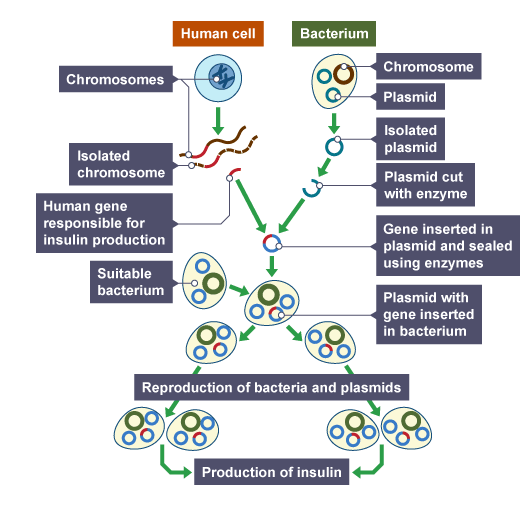Photo AI
Last Updated Sep 26, 2025
Genetic Engineering Simplified Revision Notes for GCSE AQA Biology
Revision notes with simplified explanations to understand Genetic Engineering quickly and effectively.
224+ students studying
6.2.4 Genetic Engineering
Genetic Engineering: The process of altering the genetic material of an organism by introducing a gene from another organism to give it a desired characteristic.

Applications of Genetic Engineering
- In Plants: Engineered to enhance traits like disease resistance or to produce larger fruits.
- In Bacteria: Engineered to produce substances beneficial to humans, such as insulin for diabetes treatment.
The Process:
- Gene Extraction: A desired gene is 'cut out' from an organism's DNA using restriction enzymes, creating sticky ends (unpaired bases).
- Vector Preparation: A plasmid (circular DNA) or virus is cut with the same restriction enzyme, creating matching sticky ends. The plasmid also contains an antibiotic resistance marker.
- Gene Insertion: The gene is inserted into the plasmid or virus, and the sticky ends are joined by DNA ligase enzymes.
- Transformation: The recombinant plasmid or virus is introduced into a host cell (like bacteria). As the bacteria multiply, they replicate the modified gene. Antibiotic resistance helps identify successful modifications.
- In Plants: The modified gene is introduced into meristematic (unspecialised) cells, which can grow into fully modified plants.
Genetically Modified (GM) Crops
- Benefits: Engineered for insect resistance and herbicide tolerance, leading to higher yields and less crop loss.
Genetic Modification in Medicine
- Gene Therapy: The introduction of normal genes into a patient's cells to correct genetic disorders by producing the correct proteins.
Benefits and Risks of Genetic Engineering
| Benefits | Risks |
|---|---|
| Medicine: Mass production of hormones (e.g., insulin) using microorganisms. | Environmental Impact: GM crops might affect wild plants and insects, potentially reducing biodiversity. |
| Agriculture: Enhanced yields by improving growth rates, enabling crops to grow in extreme conditions, and producing natural pesticides or herbicides. | Health Concerns: The long-term effects of GM crops on human health are not fully understood. |
| Nutritional Enhancement: Crops with added vitamins can be produced in areas where nutrients are scarce. | Ethical Concerns: Genetic engineering in agriculture might lead to human genetic modifications, raising concerns about designer babies. |
| World Hunger: Increased yields could help address food shortages as the global population grows. | Resistance: GM crops could create super weeds and pests due to increased resistance to herbicides and pesticides. |
500K+ Students Use These Powerful Tools to Master Genetic Engineering For their GCSE Exams.
Enhance your understanding with flashcards, quizzes, and exams—designed to help you grasp key concepts, reinforce learning, and master any topic with confidence!
60 flashcards
Flashcards on Genetic Engineering
Revise key concepts with interactive flashcards.
Try Biology Flashcards6 quizzes
Quizzes on Genetic Engineering
Test your knowledge with fun and engaging quizzes.
Try Biology Quizzes15 questions
Exam questions on Genetic Engineering
Boost your confidence with real exam questions.
Try Biology Questions17 exams created
Exam Builder on Genetic Engineering
Create custom exams across topics for better practice!
Try Biology exam builder21 papers
Past Papers on Genetic Engineering
Practice past papers to reinforce exam experience.
Try Biology Past PapersOther Revision Notes related to Genetic Engineering you should explore
Discover More Revision Notes Related to Genetic Engineering to Deepen Your Understanding and Improve Your Mastery
